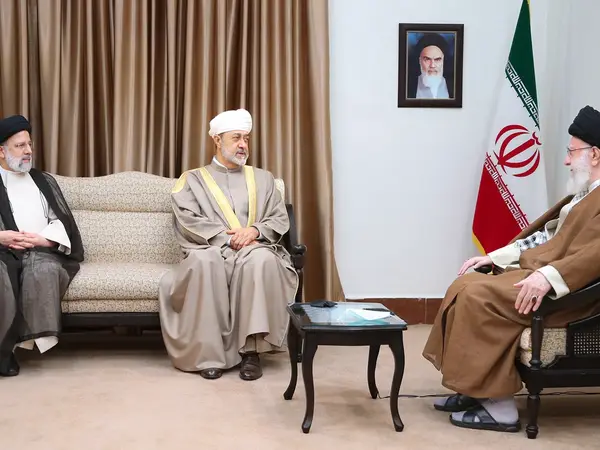Only two days after Muscat mediated a prisoner swap between Iran and Belgium, Sultan Haitham bin Tariq al-Said traveled to Tehran, meeting with President Ebrahim Raisi and Supreme Leader Ali Khamenei.
Traditionally, Oman works as a mediator between Iran and Western countries, and it also plays a role in facilitating relations between Tehran and Arab countries. It was one of the key players in the talks which eventually led to Iran and Saudi’s détente.
Given that this time the Sultan himself has come to Iran, there is no doubt this is a vital visit. Almost all of the reports by Iranian state media on the first day of the visit were focused on bolstering economic cooperation between the two countries, with some discussion on recent developments in the region. However, no details about trade or regional diplomacy were released.
The joint statement released after Oman’s sultan meeting with the Iranian president abounds with clichés such as “strengthening friendly and brotherly relations on the basis of common interests, especially in the fields of trade, energy, investment and culture.”
On the second day of the trip, Sultan bin Tarik met with the Supreme Leader, apparently delving deeper into Iran’s détente with its classic rivals Saudi Arabia and Egypt. The only takeaway from the readout of the meeting by Khamenei’s office, was the Supreme Leader’s welcoming of better relations with Egypt.
Khamenei's comments came as Middle Eastern countries including Egypt are taking steps to ease regional tensions and relations between Egypt and Iran have often been fraught in recent decades although the two countries have maintained diplomatic contacts. In March, regional rivals Sunni Saudi Arabia and Shiite Muslim Iran ended years of hostility and agreed to restore diplomatic relations under a China-mediated deal.
The presence of Iran’s top nuclear negotiator Ali Bagheri-Kani during Oman’s sultan meeting with Khamenei, which is somewhat unusual, indicates that there must have been a nuclear aspect to the meeting, despite a possible media ban on this aspect of the talks.
The seeming lack of openness about the nuclear side of the talks has drawn suspicion from global Iran watchers who are looking to Oman to mediate in the possible revival of talks on the 2015 nuclear deal, which has fallen apart. There are also rumors that the US and the Islamic Republic are about to reach a deal in the near future, which could be among the secret topics discussed during the visit by Oman’s sultan.
Former diplomat Fereydoun Majlesi told Fararu on Monday that Oman has a respected position in the Persian Gulf. "Oman speaks on behalf of all the countries of the Persian Gulf and what is in the interest of Oman is in the interest of all Arab countries in the region,” he said, noting that minimizing the risks of tensions or wars and unease between the Islamic Republic and the US and Israel plays an important role in that.
“These countries are worried that any kind of conflict between Iran and its long-time enemies would overshadow all the peace and security they have achieved during the last half century," added Majlesi who said that Iran’s foreign minister has recently assessed the revival of the JCPOA as “important and vital and expressed willingness to restore the deal”.
Ali Bigdeli, another pundit, told Fararu that the most important possible reason for Sultan of Oman's visit to Iran is mediating for exchange of dual-national prisoners.
A source told Iran International last week that talks between Iran and the US on the release of Tehran's frozen assets could result in a deal soon.
Apparently, the talks that have made progress focused on Iranian funds held in Iraq and South Korea. Iran is apparently expected to show more flexibility on issues related to its nuclear program in exchange for the release of its funds in Iraq, and free hostages with dual nationality in exchange for its assets in South Korea.
Currently there are three dual nationals with American citizenship and two individuals with US permanent residency held by Iran on trumped-up charges of espionage.
Also on Monday, Israel’s state television channel Kan 11 reported that a deal between Tehran and Washington will be finalized in the coming weeks.
During an interview with Reshet Bet on Monday, Israeli opposition leader Yair Lapid expressed alarm about reports of the imminent nuclear agreement, saying: "Such an interim agreement is dangerous. Every effort must be made to prevent this from happening.”
